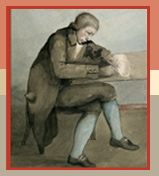Critique
Suspicions regarding material which Iolo had introduced into Welsh literature and history were raised even by Iolo Morganwg's contemporaries, among them David Thomas (Dafydd Ddu Eryri) and Edward 'Celtic' Davies. But the resources and scientific tools available to them were as yet too limited to prove beyond doubt that some of Iolo's discoveries were in fact forgeries. Thomas Stephens, a Merthyr Tydfil pharmacist, and Edward Owen, a civil servant, were the first serious critics of Iolo's counterfeit material. They paved the way for the professional academics, among them Sir John Morris-Jones, Sir Ifor Williams and G. J. Williams, who began to subject Iolo's work to a thorough critique from the 1890s. Their work, carried out amid considerable controversy, led to the abandoning of much of Iolo's counterfeit material and to the 'self-correction' of Wales's national history. It also led to the condemnation of Iolo Morganwg, the forger who, in the eyes of many of these 'new scholars', had poisoned the sources of Welsh scholarship for nearly a century.Gorsedd
In 1896 the influential author and publisher Owen M. Edwards confirmed John Morris-Jones's judgement regarding the provenance of the Gorsedd but refuted his calls for abandoning it:In his new article on the 'Gorsedd of the Bards of the Isle of Britain', Professor J. Morris Jones, in the April number of Cymru, proves that the Gorsedd theology is not druidical at all, but an echo of the Cabbalistic literature which accompanied the revival of Letters and the Reformation, between the fourteenth and the seventeenth centuries. Professor Jones will probably succeed in proving that nothing connected with the Gorsedd can be traced back to a date earlier than Tudor times. It is to be hoped that, henceforth, the ignorant generalising concerning hoary antiquity and impossible druids will cease. The Gorsedd, divested of the humbug which is too often associated with it, might serve a good purpose. It might be used to show to the thousands that frequent the Eisteddfod how Literature and Music and Art are honoured in our Republic of Letters in an Eisteddfod that is the creation of a literary peasantry. But the alacrity with which the bards will hold a 'special Gorsedd', in order to confer a degree upon any rich tradesman or country squire - though absolutely wanting in the learning or genius which those degrees pre-suppose - degrade it in the eyes of all who care anything for genius, for learning in Wales.
Wales, III, no. 25 (1896), 235
Condemnation
In the foreword to his pupil's groundbreaking volume, Iolo Morganwg a Chywyddau'r Ychwanegiad (1926), Sir John Morris-Jones summed up his feelings about Iolo Morganwg:Fe ddyfeisiodd bob math ar chwedlau di-sail am hanes Cymru o'r oesoedd cyn-Crist hyd ei oes ei hun; fe sgrifennodd gyfresi o drioedd ffug-hynafol a lluosogrwydd o ffug-gofnodion o bob math am fucheddau saint, a beirdd, ac eisteddfodau, a phob cyfryw beth; ac fe gopïodd rannau helaeth o'r hen lenyddiaeth, gan newid a llygru'r cwbl, a gwthio i mewn frawddegau a pharagraffau o'i waith ei hun er mwyn iddynt gyfateb i'w honiadau ef a'u cadarnhau. Yr ydym yn araf yn ymysgwyd o'i faglau; ond wedi cael yn rhydd o un twyll, byddwn yn aml yn ein cael ein hunain yn rhwym mewn un arall. Ac y mae lle i ofni y bydd ein llên a'n hanes am oes neu ddwy eto cyn byddant lân o ôl ei ddwylo halog ef.
(He devised all kinds of unfounded tales about the history of Wales from the pre-Christian ages to his own age; he wrote a series of pseudo-archaic triads and a multitude of counterfeit notes of all kinds about the lives of saints, and poets, and eisteddfodau, and every such thing; and he copied large parts of the old literature, changing and corrupting all of it, and inserting sentences and paragraphs of his own work so that they corresponded with his own assertions and confirmed them. Slowly we are shaking off his snares; but having freed ourselves of one fraud, we often find ourselves caught in another one. And, unfortunately, it will probably be a long time before our literature and history will be cleansed of the stains of his soiled hands.)
(He devised all kinds of unfounded tales about the history of Wales from the pre-Christian ages to his own age; he wrote a series of pseudo-archaic triads and a multitude of counterfeit notes of all kinds about the lives of saints, and poets, and eisteddfodau, and every such thing; and he copied large parts of the old literature, changing and corrupting all of it, and inserting sentences and paragraphs of his own work so that they corresponded with his own assertions and confirmed them. Slowly we are shaking off his snares; but having freed ourselves of one fraud, we often find ourselves caught in another one. And, unfortunately, it will probably be a long time before our literature and history will be cleansed of the stains of his soiled hands.)


